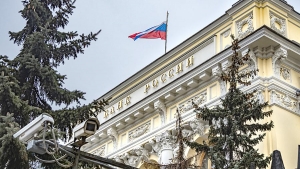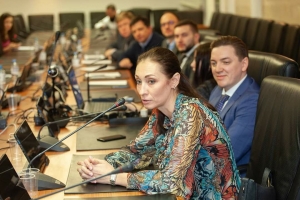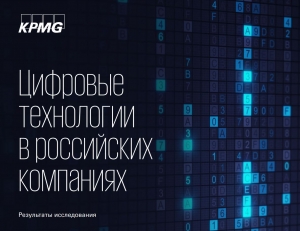Блог
Displaying items by tag: RussianFederation
EXPERIMENTAL LEGAL REGIME FOR AI IN MOSCOW (BRIEF REVIEW OF THE LAW)
On April 24, 2020, Russian President Vladimir Putin signed the Law “On an experiment to establish special regulation in order to create the necessary conditions for the development and implementation of artificial intelligence technologies in the subject of the Russian Federation - the city of federal significance Moscow and amending Articles 6 and 10 of the Federal Law” About personal data.
Essentially brief:
- from July 1, 2020, over 5 years, an experiment will be conducted in Moscow to establish special regulation in order to create the necessary conditions for the development and implementation of artificial intelligence technologies in Moscow, as well as the subsequent possible use of the results of the application of artificial intelligence in other regions. At the end of the term, regulatory documents issued for the purpose of the experiment are canceled;
- in the Law for the realization of its goals the concept of “artificial intelligence”, as well as “artificial intelligence technology” is given;
- in order to establish an experimental legal regime (hereinafter referred to as the ELR), the Moscow Government will determine, inter alia, cases of mandatory application and (or) consideration of the results of the use of artificial intelligence in the activities of the Moscow Government, as well as the procedure and cases of transfer by owners of funds and photo and video surveillance of images obtained in accordance with the conditions provided for in subparagraphs 1 and 2 of paragraph 1 of Article 1521 of the Civil Code of the Russian Federation, as well as providing access to such media cameras and photo and video surveillance systems to state authorities and organizations performing public functions in accordance with regulatory legal acts of the Russian Federation. The list of organizations performing public functions is established by the Moscow Government;
- when making transactions and other legally significant actions, an ELR participant will be obliged to notify persons who are not participants in the experimental legal regime of his status as an ELR participant and indicate the application of the Moscow Government adopted in accordance with the Law in relation to his regulatory acts. if the legally significant actions specified in this part are committed using the Internet information and telecommunication network, the participant in the experimental legal regime inform the user (party to the transaction) of all applicable provisions of regulatory legal acts of the Government of Moscow adopted in accordance with the Law in question
- requirements for agreements between ELR participants and the authorized body (it is appointed by the Moscow Government), should provide mechanisms to ensure the confidentiality of the transmitted data and the security of their storage.
- (!) Personal data obtained as a result of depersonalization and processed in accordance with paragraph 6 of part 1 of Article 4 of the relevant Law cannot be transferred to persons who are not parties to the ELR. In the event that the ELR participant status is lost or the experiment is terminated after its expiration, the person who is the ELR participant loses the right to receive personal data obtained as a result of depersonalization and personal data stored in the form The result of such depersonalization is subject to destruction in the manner established by the authorized body by agreement with the authorized federal executive body, carrying out functions for the development and implementation of state policy and regulatory regulation in the field of information technology.
- for the destruction of personal data obtained as a result of depersonalization, in the prescribed manner, the procedure for assessing the conformity of information protection means, which include the function of information destruction, is carried out. The participants of the ELR are responsible for observing the rights of the subjects of personal data in accordance with the Federal Law of July 27, 2006 No. 152-FZ “On Personal Data” for the entire duration of the experiment and after the termination of their participation in the experiment.
- during the experiment, it is not allowed to store personal data obtained as a result of depersonalization and processed on the basis of an agreement with the authorized body specified in paragraph 6 of part 1 of this article, outside the subject of the Russian Federation - the city of federal significance of Moscow.
- the status of an ELR participant is acquired from the moment it is included in the corresponding public register;
- the decision on inclusion or rejection is made by the authorized body (appointed by the Moscow Government) within a period of not more than thirty calendar days from the date of receipt of the application;
- The law provides requirements for the applicant, which, which can only be a legal entity or individual entrepreneur, registered in the territory of Moscow, as well as for the type of activity. The IP and the governing bodies of a legal entity have a requirement for the absence of an unexpunged or outstanding criminal record for crimes in the economic sphere, as well as for crimes of medium gravity, serious and especially serious crimes.
- the reasons for the refusal to be included in the register are prescribed in the Law (it seems to me quite common); in case of refusal to include in the register of ELR participants, the authorized body shall notify the applicant of this with a motivated justification for such a refusal.
- the reasons for the exclusion of the ELR participant from the register are also indicated, the exclusion is carried out within 10 working days.
- the formation of strategic directions and monitoring the activities of participants is planned to be entrusted to the ELR Coordination Council, which, on the proposal of the Government of the Russian Federation, includes representatives of federal executive bodies.
- Amendments to Article 6 and Article 10 of the Federal Law of 07.27.2006 No. 152-FZ "On Personal Data" in terms of processing conditions and in the processing of special personal data, respectively.
LAWYER APPRECIATED THE PLANS OF CENTRAL BANK TO CHANGE THE GROUNDS FOR BLOCKING ACCOUNTS
Natalya Manuylova, a forensic expert and teacher at the Moscow Digital School, commented on the Bank of Russia’s plans at the request of Izvestia to clarify the signs that could cause banks to consider their clients' actions suspicious.
The list of reasons for blocking an account has not been changed since they appeared in March 2012. Earlier, on February 17, it became known that the Central Bank proposes not only to introduce new criteria, but also to exclude some of the more than 100 existing ones, according to which banks recognize transactions as doubtful.
“The Bank of Russia revised the list of unusual transactions, excluding a number of signs, and added new signs taking into account the realities of the financial market. It is worth noting that the list of unusual operations only orient banks to pay special attention to operations that have signs of unusual. Unfortunately, quite often confused are signs of dubious operations and operations that have signs of unusual ones”, the expert added.
Regarding the qualifications of operations with digital and virtual assets, much will depend on the qualifications of bank employees, Natalya Manuylova added.
According to her, if bank employees do not have enough qualifications, then Rosfinmonitoring will replenish with information about operations that are not related to dubious ones.
Moreover, the market will resume pressure on the business to provide documents not related to the operation, threats to block customer accounts, delays in operations.
“For example, the symptom in section 11,“ The transaction is related to the acquisition or sale of virtual assets ”should be adapted for banks in the existing risk management system. The Bank should develop its own additional criteria for qualifying such an operation as “doubtful,” for example, the amount of the transaction, the business reputation of the counterparty, the counterparty’s bank, and so on. Considering that a number of signs are quite common, I think that the Bank of Russia is waiting for a rather large number of requests from both banks and customers, but here it’s already in the form of complaints, ”concluded the forensic expert.
In February, Russian Prime Minister Mikhail Mishustin, during a meeting with the head of Sberbank German Gref, said that the bank’s technologies and services would be used to simplify the life of Russians and to create a state-owned digital platform.
Source: IZ.ru
RUSSIAN FEDERATION'S MEASURES TO COMBAT MONEY LAUNDERING AND TERRORIST FINANCING
Paris, 17 December 2019 - The Russian Federation (Russia) has an in-depth understanding of its money laundering and terrorist financing risks and has established policies and laws to address these risks, but it should enhance its approach to supervision and prioritise the investigation and prosecution of complex money laundering cases, especially concerning money being laundered abroad.
The Financial Action Task Force (FATF), the Eurasian Group and MONEYVAL, assessed Russia’s anti-money laundering and counter terrorist financing (AML/CFT) system. The assessment is a comprehensive review of the effectiveness of Russia’s measures and their compliance with the FATF Recommendations. This includes an assessment of its actions to address the risks emanating from UN and domestically designated terrorists and terrorist organisations. The report does not address the justification that led to the domestic designation of an entity as a terrorist or terrorist group or organisation.
Russia recognises that it faces significant money laundering risks as a result of the proceeds of crimes committed within the country, in particular those related to corruption and its role as both a transit and destination country for narcotics trafficking. A national risk assessment, complemented by in-depth knowledge of relevant law enforcement agencies, has allowed the country to identify and understand its risks, including terrorist financing risks. Russia’s legal framework appropriately addresses these risks and the country has formal policies in place, supported by strong domestic co-ordination and co-operation, to combat money laundering and terrorist financing. However, the country needs to address gaps in its ability to freeze, without delay, assets linked to terrorism, financing of terrorism and proliferation of weapons of mass destruction, and ensure that this freezing obligation extends to all natural and legal persons.
In general, Russia cooperates with foreign counterparts, including through more than 100 international co-operation agreements with its financial intelligence unit, Rosfmonitoring. Authorities make excellent use of financial intelligence, based on a wealth of collected data and analysed with sophisticated technologies to contribute to money laundering and terrorist financing investigations. While the country has prioritised getting money back for the victims of crimes – around EUR 816 million per year – it needs to focus more on the investigation and prosecution of complex money laundering cases, especially concerning money being laundered abroad.
Russia has strengthened its oversight of the banking sector and has now mitigated the risks of criminals being the owners or controllers of financial institutions. However, deficiencies in licensing remain and the sanctions for banks that do not comply with AML/CFT requirements are not effective or dissuasive.
In general, financial and certain non-financial entities such as accountants and auditors, have a good understanding of how their services could be used to launder the proceeds of criminal activity or terrorist financing, but given that Russia is a significant centre for mining precious metals and stones, this sector’s understanding of risk is not in line with the country’s risk assessment.
Since its last assessment in 2008, Russia has strengthened its understanding of the money laundering and terrorist financing risks it faces and has developed a robust legal framework to address them. The country has taken a number of actions that have delivered concrete results. But, the country needs to address the areas of weakness this report has identified.

The FATF adopted this report at its October 2019 Plenary meeting.
OPERATORS OF INVESTMENT PLATFORMS ARE OBLIGED TO ORGANIZE MEASURES TO AML/CFT
From 01.01.2020, a new entity will appear on the financial market - the operator of the investment platform. In accordance with subparagraph 7) of clause 1 of article 2 of Federal law dated 02.08.2019 No. 259-FL "On attracting investments using investment platforms and on amending certain legislative acts of the Russian Federation" the operator of the investment platform is a business company created in accordance with the legislation of the Russian Federation, carrying out activities to organize investment attraction and included by the Bank of Russia in the register of investment platform operators.
It is worth noting that from 01.01.2020 the amendments to the Federal Law of 07.08.2001 also come into force. No. 115-FL "On combating the legalization (laundering) of proceeds from crime and the financing of terrorism" (hereinafter - Law No. 115-FL), according to which:
1. Operators of investment platforms become the subject of Law No. 115-FL (Supplement to the first part of Article 5 with a new fourth paragraph of the above law);
2. The operators of investment platforms are entrusted with the obligations specified in Article 7 of Law No. 115-FL, including the application of measures to freeze (block) money or other property in accordance with the requirements established by subparagraph 6 of paragraph 1 of Article 7 of Law No. 115- Federal Law.
3. The operators of investment platforms have been granted the rights specified in Article 7 of Law No. 115-FL, in particular:
- simplified identification of investment platform operators with respect to customers in certain cases, namely: when concluding agreements on the provision of investment assistance services involving investment using the investment platform for an amount not exceeding 100,000 rubles, provided that all settlements are carried out exclusively in non-cash form on accounts opened with a Russian credit institution;
- an assignment of the identification procedure to third parties - on the basis of the contract to entrust the credit organization with the identification or simplified identification of the individual customer, as well as the identification of the client’s representative, beneficiary and beneficial owner.
4. The internal control rules of the Investment Platform Operators are developed taking into account the requirements approved by the Central Bank of the Russian Federation in agreement with the authorized body, and approved by the head of the organization.
5. Qualification requirements for special officials responsible for the implementation of internal control rules, targeted internal control rules, as well as requirements for training and education, identification of clients, client representatives (including identification of the sole executive body as a representative of the client), beneficiaries and beneficial owners are determined in accordance with the procedure established by the Bank of Russia.
Please note that non-compliance with the requirements of Law No. 115-FL entails the prosecution of an official and organization on the basis of Article 15.27 of the Code of Administrative Offenses of the Russian Federation. The consequences of non-compliance with the requirements of the AML/CFT legislation May result in criminal prosecution.
For questions regarding the organization of work on the implementation of Law No. 115-FL and training, write to This email address is being protected from spambots. You need JavaScript enabled to view it. or This email address is being protected from spambots. You need JavaScript enabled to view it..
IMPORTANT APPROACHES TO THE ORGANIZATION OF WORK ON IMPLEMENTATION OF AML/CFT LEGISLATION REQUIREMENTS
On March 27, 2019, training for students of the 7th stream of the BCL (Blockchain Lawyers) supplementary education program was completed at the Federation Council.
As part of that, the audience in a round table format along with the first deputy chairman of the Federation Council Committee on Economic Policy, the founders and teachers of the course, as well as invited experts discussed the regulation of the digital economy and modern technologies in Russia.
Natalya Manuilova paid special attention to the following issues: that the Bank of Russia had several new and important documents aimed at fulfilling the requirements of the legislation in the area of countering the legalization (laundering) of proceeds from crime and the financing of terrorism (AML/CFT). Important on the approach to the organization of work in this direction.
Thus, one of these documents is Directive No. 5083-U of 02/27/2019 “On Amendments to the Regulation of the Bank of Russia of March 2, 2012 No. 375-P“ On the Requirements for the Rules of Internal Control of a Credit Organization to Counter Legalization (Money Laundering) criminal proceeds and the financing of terrorism. ” In accordance with the changes that will come into force on 04/05/2019, the ML/TF risk management systems in credit institutions will have to take into account the results of a national risk assessment of transactions (transactions) in order to legalize (launder) proceeds from crime, and the financing of terrorism, posted on the official website of the authorized body on the Internet information and telecommunications network.
The possibility for credit institutions to install in the Risk Management Programs “other factors independently determined by the credit organization” scares many, but these factors must be fixed, fixed in the Rules of the credit organization. And no one has canceled a systematic approach - why are some requirements for some, and others for others? “Documentary fixation” will compel to substantiate certain AML/CFT measures.
In accordance with the Bank of Russia Newsletter No. IN-014-12/27 of 03/27/2019 “On Approaches to the Procedure for the Implementation of Credit Rights by Credit Institutions Provided by Sub-clause 1.1 of Clause 1 of Article 7 of Federal Law No. 115 “On Counteracting Legalization (Laundering) of Revenues criminal proceeds and the financing of terrorism” the Bank of Russia draws the attention of credit institutions to the need to follow the results of their assessment of the extent (level) of the risk of a client’s operations for AML/FT when implementing these powers in accordance with its own rules of internal control in order to counter the legalization (laundering) of proceeds from crime and the financing of terrorism.
Will high-risk transactions (deals) with digital assets be added to the list? Definitely! Companies need to start preparing letter templates - explanations about the sources of funds received to the account, etc.
The Bank of Russia still had to pay attention to the not quite adequate measures of credit institutions regarding blocking accounts under federal law 115, inquiries about the source of clients funds, whose operations in principle do not bear and cannot bear the risks of ML/FT and the risk of involvement credit organization in the scheme of ML/FT.
Let's hope for positive changes, because for a long time, the “struggle” of a number of banks on AML/CFT issues has discredited the AML/CFT system as a whole, and only the one who has not come to the bank does not care about 115-FL.
At the same time, the information letter of Rosfinmonitoring dated March 1, 2019 No. 59 “On Methodological Recommendations for Assessing ML/TF Risks by Organizations that Operate with Monetary Funds or Other Property and individual entrepreneur” was discussed.
From which it was seen that there are three types of risks:
- risks associated with countries and individual geographic territories (country risks);
- customer related risks (customer risks);
- risks associated with products, services, operations (transactions) or supply chains made by the customer (operational risks), a high level for operations with digital assets.
DIGITAL TECHNOLOGIES IN RUSSIAN COMPANIES
At the beginning of the year, KPMG surveyed more than 100 of the largest companies and found out which technologies the Russian business is implementing, which budgets of the organization are willing to spend on such projects and how they generally approach the management of digital transformation.
Main conclusions:
63% of respondents indicated that they have developed a digital transformation program, but in reality this more often means a set of short-term pilot projects;
77% of responding companies expect increased operational efficiency and reduced costs through digitization of processes;
The most popular technologies that have already been tested by Russian companies: big data analysis and predictive analytics (68%), chat bots (51%), robotization of office processes (50%);
The position of the CDO (Chief Digital Officer) is only in 16% of companies, the committee on digitalization - in 13%. In most Russian companies, decisions on digitalization projects are made by individual consideration at the top management level;
65% of companies attract startups to implement pilot projects;
In 2019, 36% of companies are ready to invest more than 100 million rubles in the implementation of projects on digitization of processes, while 55% of respondents plan to spend less than 50 million rubles;
51% of companies expect that the investment will pay off in less than 2 years, another 43% expect return on investment within 2-5 years.
Source: KPMG | RU.
Search
Blog Category
Popular Post
Latest News
О КОСАтка
Корпоративная система аналитики Транзакция Криптовалюта Актив - кибербезопасность инфраструктуры блокчейнов и антифрод в криптовалютной сфере (антискам, прозрачность, комплаенс).
Связаться
Российская Федерация, Москва
Тел.: +7 (911) 999 9868
Факс:
Почта: cosatca@ueba.su
Сайт: www.ueba.su









